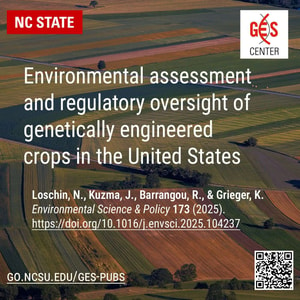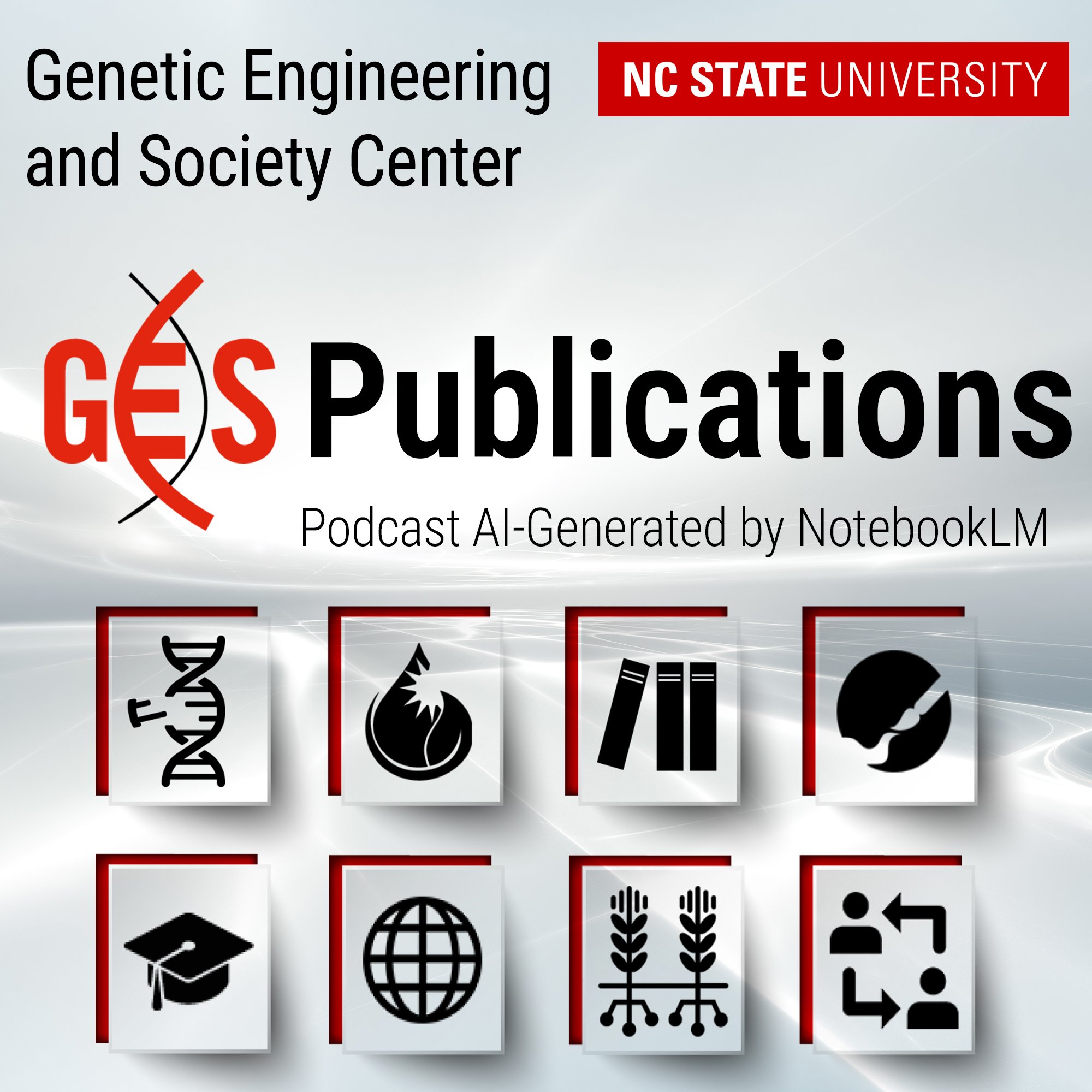S1E4 - Environmental Assessment & Regulatory Oversight of GE Crops

Commentary and overview of GES Center publications, AI-generated by NotebookLM
Environmental assessment and regulatory oversight of genetically engineered crops in the United States
This episode of the GES Publications podcast provides an AI-generated overview of the article below, highlighting key findings and insights into the societal dimensions of biotechnology. Episodes are created using Google Gemini’s NotebookLM to summarize faculty and student publications from NC State University’s Genetic Engineering and Society Center.
DOWNLOAD FULL EPISODE TRANSCRIPT
Citation
Loschin, N., Kuzma, J., Barrangou, R., & Grieger, K. (2025). Environmental assessment and regulatory oversight of genetically engineered crops in the United States. Environmental Science & Policy, 173, 104237. https://doi.org/10.1016/j.envsci.2025.104237. PDF. Graphic
Authors
Nick Loschin, Jennifer Kuzma, Rodolphe Barrangou, Khara Grieger
Abstract
Biotechnology advancements are rapidly shaping the future of food and agriculture with genetic engineering tools utilizing both classical transgenic methods and cutting-edge genome editing techniques such as CRISPR. These advancements have expanded the development of crops with novel traits, with a wide range of applications. At the same time, the regulatory system and assessment processes have struggled to keep pace with these rapid innovations and techniques. Notably, this can be an issue when investigating the potential environmental impacts in the development and production of these crops due to the complexity and temporal nature of potential risks. This study explores how environmental assessments for genetically engineered crops have been and are currently being conducted in the United States. This was done by outlining the regulatory framework and environmental assessment processes across federal agencies and then examining five case studies that reflect both incumbent and rising genetic engineering techniques. The robustness of the environmental assessment was evaluated for each case based on the submitted information and the depth of analysis conducted. Conclusions from this study gleaned three major recommendations: (1) the need for governance systems keeping pace with novel innovations, (2) an overall strengthening of environmental oversight for genetically engineered crops, and (3) the need for transparency throughout the assessment processes. This research aims to foster improved environmental assessment and governance practices for novel applications of genetic engineering in food and agriculture systems.
Significance
This study aimed to clarify and evaluate the environmental oversight process for GE crops in the U.S. by analyzing publicly available information and literature on governance and regulatory responsibilities, particularly those of the EPA and USDA. We examined five case studies to assess the robustness of environmental evaluations as GE crops moved through the U.S. regulatory system. Our analysis revealed three key takeaways about the governance of GE crops that should be considered to strengthen environmental assessment and oversight practices. First, regulatory frameworks must keep pace with advances in biotechnology. Second, environmental oversight of GE crops should be strengthened by expanding assessment parameters beyond traditional evaluations and strengthening environmental monitoring. Third, transparency and engagement in the oversight process must be strengthened. As GE technologies and applications continue to evolve and expand (e.g., sprayable RNAi and spray-on genome editing), and regulators decide what is needed in their oversight, this study offers insights into improving environmental assessment procedures. By illustrating both strengths and limitations in the current system, this research aims to foster more effective and adaptive regulatory practices for GE crops in a globally integrated food and agriculture supply chain. It may also be applicable to a global geopolitical context as countries across the world continue to adapt their regulations and oversight with novel biotechnology innovations.
Keywords
Biotechnology Regulation, Genetic Engineering, Genome Editing, Environmental Assessment, Regulatory Oversight, Biotechnology Governance, Emerging Technologies
Genetic Engineering and Society Center
Explore More
- Browse the full GES publication library: go.ncsu.edu/ges-pubs
- Learn about the GES Center: go.ncsu.edu/ges
- For live recordings from our Colloquium series, subscribe to our companion podcast, GES Center Lectures: go.ncsu.edu/ges-podcast
GES Center at NC State University—Integrating scientific knowledge & diverse public values in shaping the futures of biotechnology.
Produced by Patti Mulligan, Communications Director, GES Center, NC State
Find out more at https://ges-publications.pinecast.co
